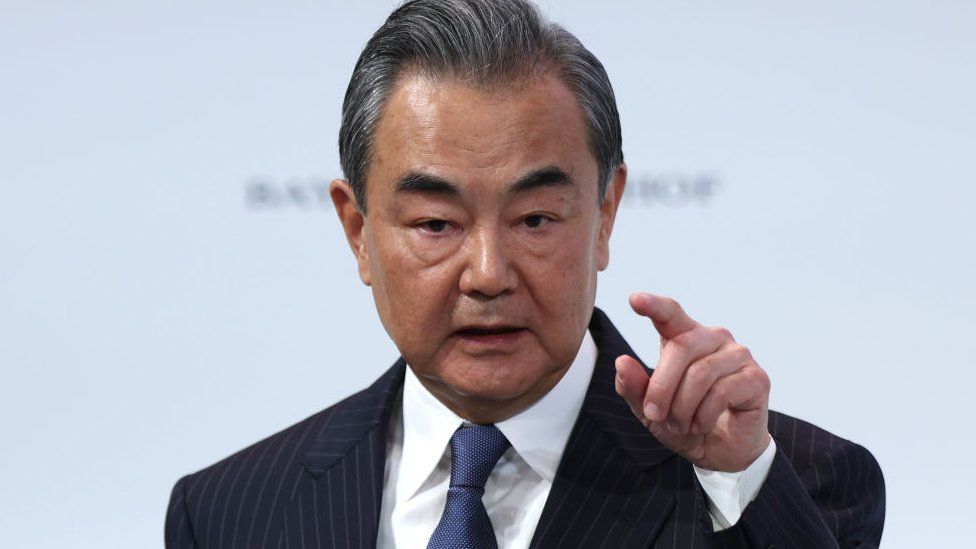
This article is more than
3 year old
Mr Blinken told CBS News that Chinese companies were already providing "non-lethal support" to Russia - and new information suggested Beijing could provide "lethal support".
This escalation would mean "serious consequences" for China, he warned.
China has denied reports that Moscow has requested military equipment.
Chinese President Xi Jinping is an ally of Russian President Vladimir Putin and is yet to condemn Russia's invasion - but he has sought to remain neutral in the conflict and has called for peace.
Mr Blinken was speaking to CBS after he met China's top diplomat, Wang Yi, on Saturday at the Munich Security Conference.
He said that during the meeting he expressed "deep concerns" about the "possibility that China will provide lethal material support to Russia".
"To date, we have seen Chinese companies... provide non-lethal support to Russia for use in Ukraine. The concern that we have now is based on information we have that they're considering providing lethal support," he said.
He did not elaborate on what information the US had received about China's potential plans. When pressed on what the US believed China might give to Russia, he said it would be primarily weapons as well as ammunition.
The US has sanctioned a Chinese company for allegedly providing satellite imagery of Ukraine to the mercenary Wagner Group, which supplies Russia with thousands of fighters.
Mr Blinken told CBS that "of course, in China, there's really no distinction between private companies and the state".
If China provided Russia with weapons, that would cause a "serious problem for us and in our relationship", he added.
Relations between Washington and Beijing were already poor after the US shot down an alleged Chinese spy balloon in early February. Both sides exchanged angry words, but equally both sides appeared embarrassed by the incident and seemed ready to move on.
But if China were to deliver weapons to help Russian forces in Ukraine, then US-Chinese relations would deteriorate much more severely.
Mr Blinken's warning seems to be clearly designed to deter China from doing that.
Mr Blinken also said the US was worried about China helping Russia evade Western sanctions designed to cripple Russia's economy. China's trade with Russia has been growing, and it is one of the biggest markets for Russian oil, gas, and coal.
Nato members, including the US, are sending a variety of weapons, ammunition and equipment to Ukraine, including tanks. They have stopped short of sending fighter jets, and Mr Blinken would not be drawn on whether the US would help other countries supply jets.
"We've been very clear that we shouldn't fixate or focus on any particular weapons system," he said.
He did, however, say that the West must ensure Ukraine had what it needed for a potential counter offensive against Russia "in the months ahead". Russia is currently trying to advance in eastern regions of Ukraine, where some of the fiercest fighting of the war has taken place.
Mr Wang said in Munich yesterday that China had "neither stood by idly nor thrown fuel on the fire" for the Ukraine war, Reuters reported.

China would publish a document that laid out its position on settling the conflict, Mr Wang said. The document would state that the territorial integrity of all countries must be respected, he said.
"I suggest that everybody starts to think calmly, especially friends in Europe, about what kind of efforts we can make to stop this war," Mr Wang said.
He added that there were "some forces that seemingly don't want negotiations to succeed, or for the war to end soon", but did not say who he meant.
The Chinese President, Mr Xi, is scheduled to deliver a "peace speech" on the anniversary of Russia's invasion of Ukraine on Friday, 24 February, according to Italy's foreign minister Antonio Tajani.
Mr Tajani told Italian radio that Mr Xi's speech would call for peace without condemning Russia, Reuters reported.
During their meeting, Mr Blinken and Mr Wang also exchanged strong words on the deepening row over an alleged Chinese spy balloon that was shot down over the US.
Mr Blinken said during the meeting that the US would not "stand for any violation of our sovereignty" and said "this irresponsible act must never again occur".
Mr Blinken told CBS that other nations were concerned about what he called China's "surveillance balloon program" across five continents.
Mr Wang, meanwhile, called the episode a "political farce manufactured by the US" and accused them of "using all means to block and suppress China". China has denied sending a spy balloon.
And on Sunday morning, Beijing warned that the US would "bear all the consequences" if it escalated the argument over the balloon. China would "follow through to the end" in the event "the US insists on taking advantage of the issue", it said in a foreign ministry statement reported by Reuters.
The full interview with CBS - the BBC's US broadcasting partner - is due to air on Sunday.